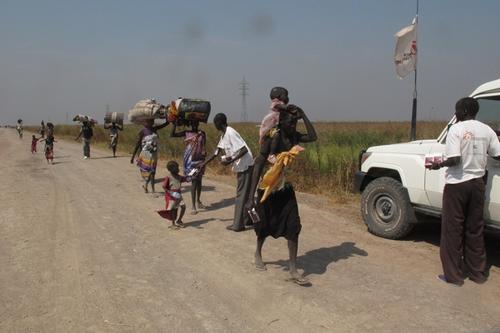In the violence that swept through South Sudan over the past two months, MSF was forced to evacuate clinics and hospitals due to insecurity. Here emergency coordinator Jean-Pierre Amigo, describes what happened when MSF was forced to evacuate Bentiu, capital of Unity State, on 8 January.
The atmosphere in the compound was very heavy – the children weren’t even playing, which is always a bad sign. Nobody was smiling, and there was a great deal of suspicion between people – they’d stop talking if anyone came close. The different ethnic groups were not mixing, and each group was afraid of the others.Bentiu, in Unity state, had been very tense for weeks. There were about 8,000 people sheltering in the UN compound, all scared of being attacked, all in fear of their lives.
We had set up a health clinic inside the Protection of Civilians area of the UN compound, and our teams were also working in Bentiu State Hospital. Prior to the conflict, we had been running an HIV and TB programme there, but when the crisis started we immediately shifted part of the medical team to the surgery ward and started to take care of the wounded.
Gunshot wounds
There were battlefields in both directions. Although the fighting was too far away for us to hear the gunfire, every day people were brought in with gunshot wounds. Most of our patients had been wounded whilst they were fighting. Unfortunately, in battles like that, it’s rare for wounded civilians to be able to reach a medical facility in time.
When we heard that forces were approaching Bentiu, we knew that the town would most probably become a battleground. There was an atmosphere of panic, and people started leaving the town. The fighting became very close and it was dangerous to move around. We made the decision to evacuate on 8 January.
It’s always a very difficult moment – a mix of shame and helplessness – to understand that you can no longer help, and that you have to leave patients behind. We left supplies with the patients and their caretakers so they could continue their treatment even if they couldn’t access a health facility – a ‘runaway pack’ containing all the materials they would need. Two days after we left, we had news that the hospital was completely empty and that all the patients had managed to escape. We just hope they managed to survive.
It’s always a very difficult moment – a mix of shame and helplessness – to understand that you can no longer help, and that you have to leave patients behind.
Jean-Pierre Amigo, MSF emergency coordinator
Exhausting journey
We evacuated by road to Leer, 130 km to the south of Bentiu. On the road, we saw that a lot of people were leaving the town on foot. Most were heading for Leer, a seven-day walk for the slowest. It was very hot, there are almost no villages along the way, and there are very long distances on the road without a single tree. People were sleeping in the bush or on the sides of the road in the open air. We had no doubt that such an exhausting journey would be difficult or even impossible for people to endure.
The following day – and every day for the next seven days – we went back and distributed high energy food to the 10,000-15,000 people we met on the road. Later, in Leer, we met people who thanked us and told us they could not have made it without the food we gave them on the journey.
On our way back, we loaded up our cars with people who needed medical attention – including those with bullet wounds, heavily pregnant women and people with snakebites. We also took people disabled by polio, amputees from previous conflicts, blind people and many others.
Health centres overwhelmed
In Leer, our outpatient department was completely overcrowded. Very few health centres in South Sudan are still functional, so the pressure has increased on the few that are still running.
It is so important that MSF is able to continue working in South Sudan. We are among the very few organisations that can manage to work in the hard to reach places, where people are left without assistance – because of our independence, our neutrality, and the fact that we’ve been in the area for a long time – in some places more than 20 years. People know us and trust us and even more importantly, they depend on us for life-saving assistance and to stay beside them for as long as possible during difficult moments.
And there is no doubt that people are in dire need of the support we provide. Now, with the systematic looting and destruction of towns, food stores and markets, and with the hunger gap and the rainy season on its way, we are needed more than ever. I can’t stop thinking about all the people hiding in the bush, including our South Sudanese staff and their families. It isn’t easy working in South Sudan, but we won’t give up. There are too many people in need.
An MSF team returns next week to re-start much needed medical programmes in Bentiu.
Due to worsening insecurity in southern Unity State, the MSF local team in Leer was forced to flee into the bush on January 30th with several dozen of the most severely ill patients. MSF's Leer Hospital is now empty of patients and staff and was the only fully functioning hospital in southern Unity State. MSF hopes to return to Leer as soon as security allows.
See all MSF coverage of its response to the South Sudan crisis.



